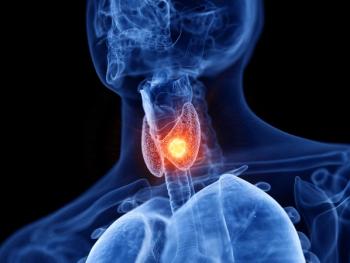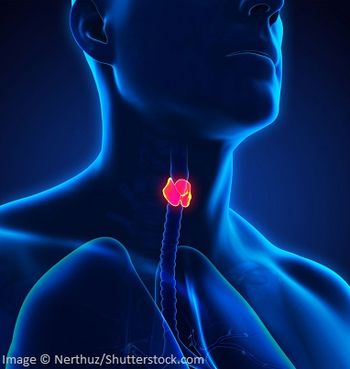
Oncology NEWS International
- Oncology NEWS International Vol 12 No 2
- Volume 12
- Issue 2
Metastatic Thyroid Cancer Responds to Thalidomide Therapy
NEW YORK-An ongoing trial of thalidomide (Thalomid) in patients with aggressive, advanced papillary and follicular thyroid carcinomas produced an early response rate of 76%, according to a report presented at the Mount Sinai School of Medicine Chemotherapy Foundation Symposium XX.
NEW YORKAn ongoing trial of thalidomide (Thalomid) in patients with aggressive, advanced papillary and follicular thyroid carcinomas produced an early response rate of 76%, according to a report presented at the Mount Sinai School of Medicine Chemotherapy Foundation Symposium XX.
The trial is enrolling patients with distant metastases from medullary thyroid carcinomas as well as papillary and follicular thyroid cancers unresponsive to radioiodine therapy, reported Kenneth B. Ain, MD, professor of medicine and director, Thyroid Nodule & Oncology Clinical Service, University of Kentucky.
To be eligible for the study, patients must have a 30% increase in tumor volume in the preceding year; the distant tumor sites must be unresectable; and patients must not have previously taken thalidomide or be pregnant.
Under the protocol, patients are started on 200 mg thalidomide taken daily at bedtime. After 2 weeks, the dosage is increased to 400 mg/d and patients are asked about compliance and toxicity. "Then they are rapidly titrated to either 800 mg a day or their maximum tolerated dose," Dr. Ain said. "Sometimes, the dose is reduced if they have grade 3 side effects, but ultimately we get them on a stable dose."
The goal is to have 25 evaluable patients with papillary and follicular thyroid carcinoma and 25 with medullary disease. At the time of the preliminary analysis reported by Dr. Ain, 17 patients with papillary and follicular cancers were evaluable. The medullary cancer group had 6 evaluable patients.
Initial evaluation of treatment effect was performed with digitalized CT scans of tumor mass 2 months after patients began the protocol. "If there was a positive response as denoted by tumor stabilization or decrease, or dramatic reduction in growth rate," Dr. Ain said, "they were continued on thalidomide and re-evaluated every 2 months." If disease progression was noted, they were dropped from the study.
Study Results
Of the 17 evaluable patients with papillary and follicular cancers, 4 did not respond to thalidomide therapy. "But surprisinglyin fact, amazinglythere were 13 responders, for a 76% early response rate," Dr. Ain said. Two of the responders remain on thalidomide: One has now been on the treatment for about 15 months, the full length of the trial, and the other for nearly a year.
Treatment was stopped in six patients due to disease progression. The mean time to disease progression was 7 months. Five patients who were responding to therapy and whose disease had stabilized chose to stop treatment due to toxicity or poor compliance with the protocol.
In the group of 6 evaluable patients with medullary cancer, 2 responded to thalidomide treatment. "Of the responders," Dr. Ain noted, "one died of pneumonia but had disease progression after 4 months, although, I have to say, this was discordant disease progression. Tumor in the liver that was aggressive was still inhibited, but tumor was growing in the pelvis, spine, and neck region."
Assessment of tumor size was difficult, Dr. Ain said, and involved analysis with software that took into account CT slice thickness as well as lesion outlines. Sites assessed most often for tumor growth were lung, liver, and pelvis.
"The problem, of course, is that tumors don’t always grow at the same rate," he said. "There is discordant growth, and we had to assess the sum total tumor mass." Metastases to bone, he noted, did not seem as responsive to antiangiogenic activity as other sites.
Of the 15 patients who responded to the therapy, 5 have died, as have 5 of the 8 who did not respond. The mean time to death from initiation of the protocol was 7.7 months among responders and 3.3 months for nonresponders.
Dr. Ain stressed that responders and nonresponders "were absolutely no different in their presentation." Thalidomide dosages ultimately maintained averaged 563 mg/d among patients responding to treatment and 650 mg/d in nonresponders. The levels in the two groups, Dr. Ain observed, indicate that failure to respond was not due to dosage.
Toxicities
"Toxicities were exactly as one would expect from trials that have been done with thalidomide," Dr. Ain said. "Peripheral neuropathy was significant for grades 1-2. Anyone who tended to go to grade 3 had dose reduction, and those symptoms were mitigated." In all, about 70% of the patients experienced some neuropathy.
Most patients reported some sedation, but for 57%, it was grade 1. Constipation occurred in 30% of the patients. Other adverse events included two cases of grade 2 neutropenia and one case of vasovagal syncope. "We had three patients who had severe pneumonia, but they had no neutropenia," he said, "and we believe that postobstructive pneumonia after metastatic tumor of the lungs may be expected from the disease process."
While thalidomide was able to suppress some tumors for more than 7 months, Dr. Ain noted, responsiveness to the drug eventually declined in many patients. Toxicity, he added, is responsible for discontinuance of therapy in a significant number of patients. For the future, he is hopeful that more potent antiangiogenic agents with less toxicity will be introduced and "prove even more advantageous for these patients."
Articles in this issue
about 23 years ago
Some Activity for Gefitinib in Heavily Pretreated Breast Cancerabout 23 years ago
Brachytherapy Results Similar for Blacks, Whitesabout 23 years ago
Dose-Dense Chemo Ups Survival in Node+ Breast Cancerabout 23 years ago
MR Spectroscopy IDs Breast Cancers, Node Involvementabout 23 years ago
ODAC Wants More Data on Expanded Casodex Indicationabout 23 years ago
SuperGen Submits First NDA Module for Pancreatic Cancer Drugabout 23 years ago
Two Added to ONI’s Oncology Nursing Editorial Advisory Boardabout 23 years ago
Bortezomib Active in Relapsed/Refractory Myelomaabout 23 years ago
Telomerase Potential Cancer BiomarkerNewsletter
Stay up to date on recent advances in the multidisciplinary approach to cancer.



































